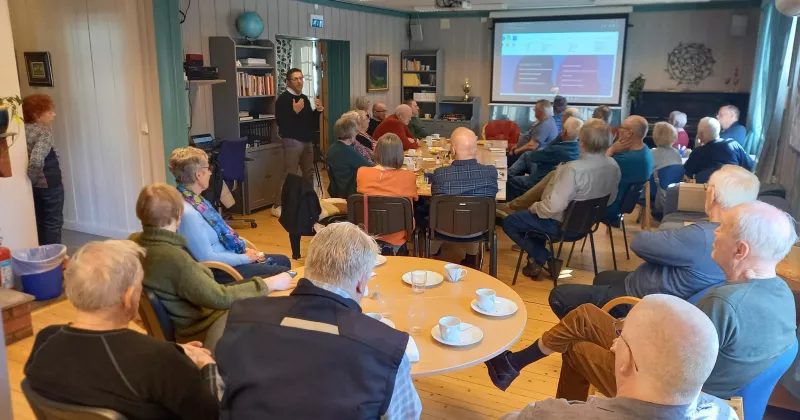On the work for the educationally disadvantaged and together with them
Raising awareness, guidance, and validation — a major triple challenge in adult education.
In recent years, the national coordinators for the implementation of the European Agenda for Adult Learning (EAAL) have been meeting at consultation events, so called PLAs (Peer Learning Activities). Beforehand, we decide on current topics, and then we form groups according to our own main areas of work, in which we exchange our expertise and examples from practice. In April 2018, Slovenia actively participated in the PLA event on raising awareness and guidance in adult education that took place in Luxembourg (learn more in the article).
In February this year, when defining the content for PLA events in the period 2020-2021, we again put emphasis on the above two topics, which seem to be inexhaustible (and closely interlinked). We also added the issue of validation of previously acquired knowledge and skills. All three topics in itself require a great deal of commitment, but when it comes to educationally disadvantaged groups (often called vulnerable), we agreed that the challenges are even greater.

At a request of the European Commission (EC), the Slovenian Institute for Adult Education (SIAE) took over the coordination of this meeting as a part of the EAAL project. The PLA’s content was co-created together with the representatives of Bulgaria, Iceland, Poland, Slovakia, and Spain. We were confident that the live event would take place in May, alongside the National Opening of Jubilee Lifelong Learning Weeks (LLW). However, what happened due to covid-19 was that we hosted it only on 15 and 16 September in a digital environment and in connection with the 24th Adult Education Colloquium (AEC – in Slovenian). In our first Zoom event with international participation, around 80 participants from 30 European countries took part. Slovenian twenty-five member delegation included SIAE employees as well as representatives of the LLW network and ISIO guidance centres.
The event also served for the promotion of Slovenia and our adult education.
In the beginning, the EC representative, Martina Ní Cheallaigh, said a few words about current events on the European level. The new European Skills Agenda for sustainable competitiveness, social fairness and resilience, adopted on 1 July 2020, lays the foundations also for the new EAAL and adult education in general. National coordinators will discuss this in more detail at the meeting that will be held on 15 October.
This year in Slovenia, we are mainly working on the preparation of a new Resolution on the Adult Education Master Plan (ReNPIO) 2021-2030 and executive acts following the Adult Education Act (ZIO-1, 2018 – in Slovenian). We dedicated a few introductory words to this and impressed the participants with the fact that we are already implementing the cooperation of nine ministries in the current Adult Education Master Plan 2013-2020.
As LLW were also in full swing in those days, we talked about the experience with the virtual opening of LLW (4 September) and the Learning Parade (9 September; in Slovenian). To warm-up, we showed a presentation movie about Slovenia on the first day, and on the second day, a rap anthem of lifelong learning. The participants welcomed both with enthusiasm.
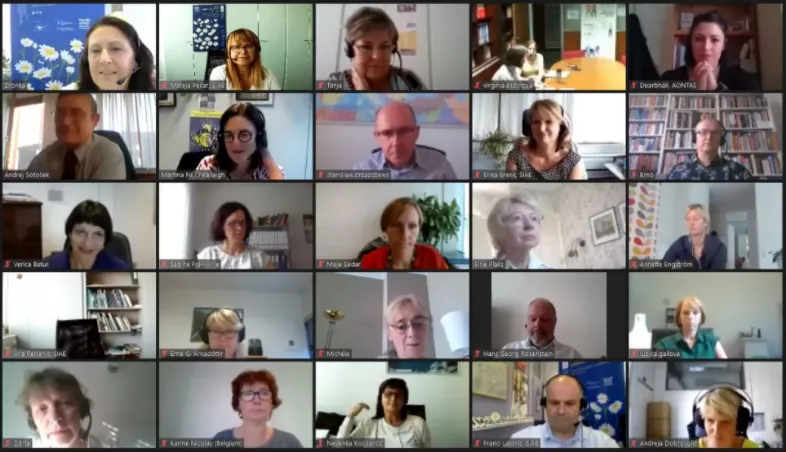
The central part of the PLA event consisted of eight thematic presentations of the above-mentioned countries (available here). Along with this, a lively interaction took place in the Zoom Chat Room, as the performers were supported by other participants with their comments and questions.
Now about the contents and findings.
Since 2004, the Slovenian guidance model has placed special emphasis on outreach — reaching vulnerable target groups where they live and work. In her presentation, Tanja Vilič Klenovšek from SIAE emphasised the importance of local partnerships, which are established throughout the country by 17 guidance centres operated under the coordination of SIAE. Other conditions to ensure efficiency are a planned, well-designed model, a sufficient number of counsellors who are constantly in training, and, of course, sufficient funding from the state and the European Social Fund. Outreach activities continued even during the covid-19 epidemic, however, in a different manner. Maja Rotar from the Cene Štupar – Ljubljana Public Education Centre reported that in practice, this had advantages and disadvantages, and she also emphasised that the gained experiences are an excellent foundation for the future.
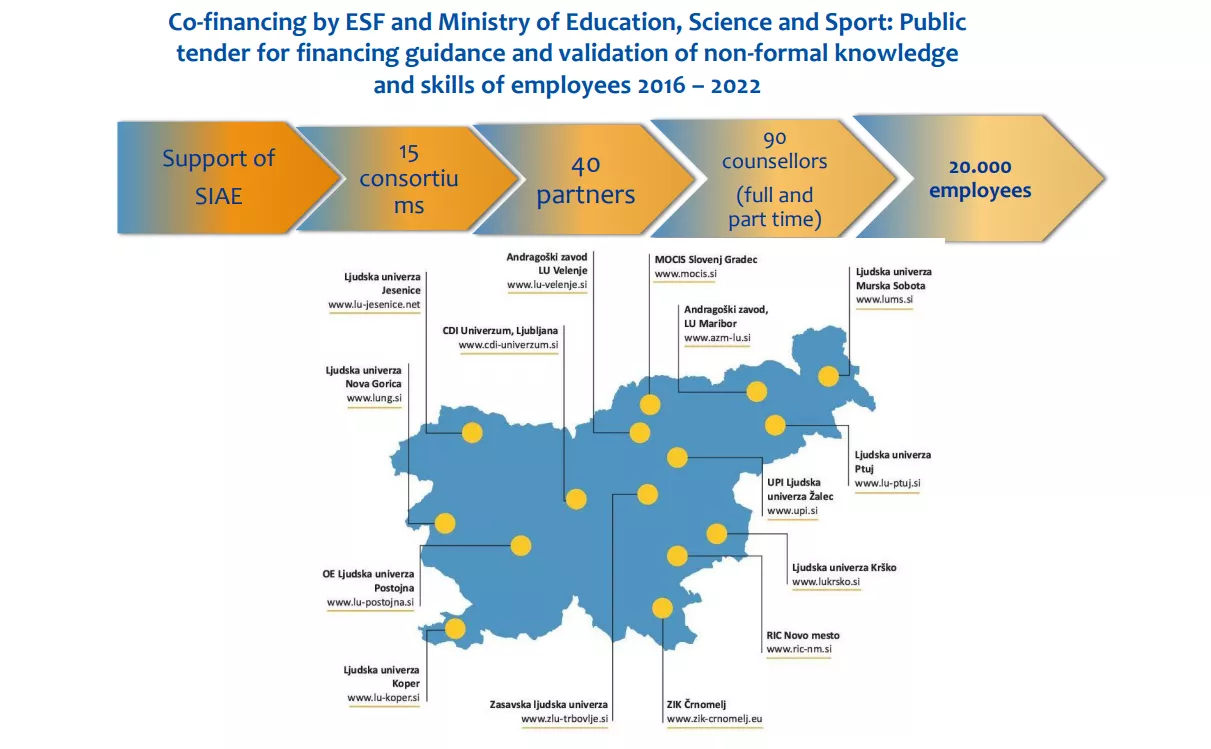
In her presentation, Estera Možina spoke about training in the work environment, where the transfer of gained knowledge and skills into practice is most direct. In the Profi-Train project (Erasmus +, KA2), which she briefly presented, she emphasised the need for programmes tailored to the characteristics and needs of participants, employers, and the wider environment. Adult educators entering into enterprises need to be adequately trained and empowered with rich experiences. They are involved in continuous training and use appropriate tools. In Slovenia, we are now introducing SVOS (Education and Skills Online) — an OECD skills assessment tool that we have adapted to Slovenian conditions.
Education and guidance must be brought to the people, Dóra Stefánsdóttir emphasised in the Icelandic presentation, and pointed out the unequal geographical distribution of their population. One-third of the population, which is scattered across rural areas, is most easily included in online education, the share of which is also growing colossally among two-thirds of the population living in Reykjavik. They work with small companies and carry out an assessment of the skills needed by their employees. In doing that, they take the current socio-economic situation into account because it dictates the need for jobs and skills — recently, for example, in tourism. They also train people with disabilities who in addition to educational opportunities, also gain social contacts, sometimes even a small earning.
The first Slovak speaker, Ľubica Gállová, presented their efforts in the EC-funded BLUESS project. It is intended for the development of a national strategy for basic skills, within which they will also develop tools for assessing and upgrading skills. Adults with low education will be their priority. Her co-presenter Michaela Mudroňová from a non-governmental organization that is working with people in need, presented an example of including Roma in education to gain reading, arithmetic, digital, social, and communication skills. Only together with partners — from the employment service to other governmental and non-governmental institutions — can they provide Roma with integrated services (social, financial, housing, and employment-related).
That social partners are indispensable allies in our work, was emphasised also in the Polish presentation held by Edyta Klimowska-Bobula and Małgorzate Dudziak from the Regional Labour Office in Krakow, Poland. There they want to provide conditions for the development of a competent, skilled, and employable population. For this reason, they have developed a voucher system for those with low or insufficient education or skills as part of their guidance activities. Counsellors no longer wait for people to come to them; instead, they have taken a proactive role and have got in touch with employers and other partners, including learners. They point out that informal learning is also important for these target groups and that the stories of successful learners are the most convincing.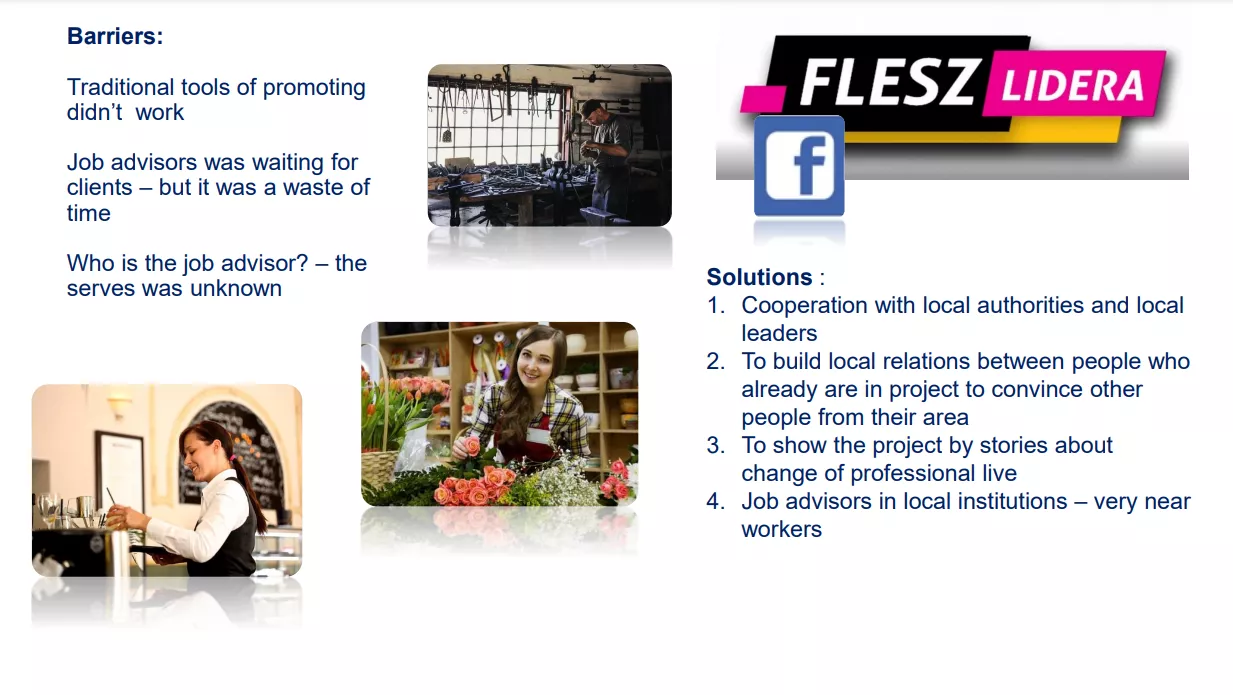
In her presentation, our Bulgarian co-presenter Sevdalina Turmanova outlined the situation in Burgas, the Black Sea region. Involvement in adult education is low; the percentage of insufficiently educated or trained is high. Time, money, support from the employer, lack of motivation, and so on are key obstacles here as well, and they overcome them with a partnership approach. For this reason, they have established a national platform United for adult learning, a part of which is also the Burgas Regional Lifelong Learning Coordination Group. They are developing an online portal for education and guidance, and they are also involved in raising awareness by organizing Lifelong Learning Days.
Ana Ferrando and Virginia Espinosa Berrocal spoke about the role of guidance in assessing and validating basic adult skills in Spain. They presented the common national model, which they are developing because the country has a low level of adult involvement in lifelong learning (10.5%) and a high percentage of young people leaving school early (17.3%); both percentages apply to the year 2019. 30% of the population has a low skill level (according to PIAAC results). They encourage adults and show them the benefits of education in life and at work. As part of the EC's structural reform programme, they are establishing a model for assessing adult skills. The programme also includes guidance, which provides support to the individual before, during, and after the skills assessment process. It is intended for all adults.
We found out that we are similar in many ways, but...?
All of us share a similar attitude, challenges, some of us perform the same activities in similar ways. However, many experiences also brought a new insight or idea, which is actually the purpose of such meetings.
We confirmed the importance of partnerships that are based on effective approaches/tools, are suitably funded and implemented with competent providers who are constantly training and adapting to the participants.
We have found that smart strategies and measures need to be planned at the national level, and they should include not only the education sector, but also social, health, economic, and many others. On the other hand, it is important to (co)operate at the regional/local level, which is closer to the people, knows their needs and other circumstances, as well as the challenges of the environment.
We agree that adults with a low level of education and inadequate skills are the most important target group in the EAAL process. In some countries, however, others are also included in the group of the educationally disadvantaged. We concluded that also employees, who are forced into retraining and additional training by precarious conditions, as well as employers, are partners in our efforts.
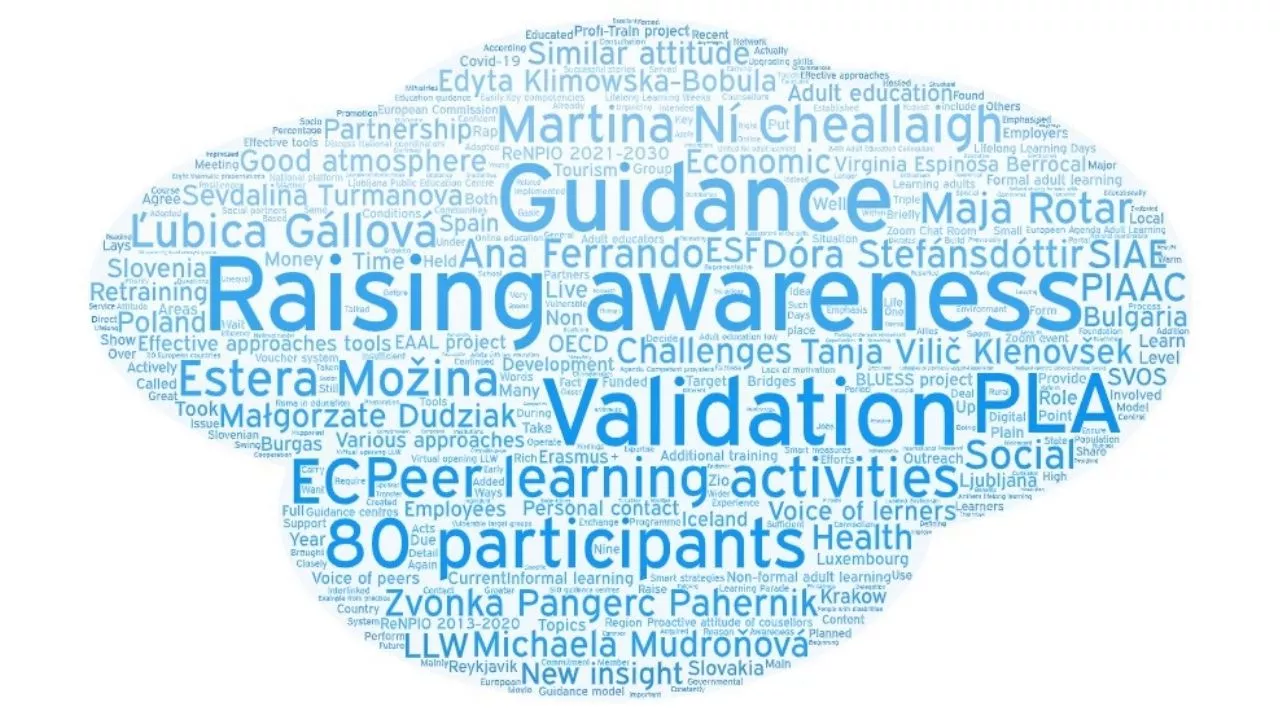
We spoke about the complementary roles of formal, non-formal, and informal adult learning. And the need to build bridges — also with the development of a validation system that supports the transitions and upgrading of knowledge and skills. This system is still not implemented in many places.
The proactive attitude of counsellors was emphasised because it is necessary to go there where the specific target groups are located. Personal contact and various approaches to raise awareness are crucial. Among them, the voice of peers — learners, who through learning, have managed to improve their lives, work, and relationships in their communities — is very important.
We have actually already spoken briefly about the remaining three PLA topics. But that is all right. The good atmosphere at this first meeting is a guarantee that we will only deepen our exchanges and insights – at further live events or otherwise.
Zvonka Pangerc Pahernik at ACS works in the field of promotional and information activities. She is a national coordinator for the implementation of the European Agenda for Adult Learning. She is interested in pervasive promotional approaches and the integration and participation of stakeholders in the adult education.





